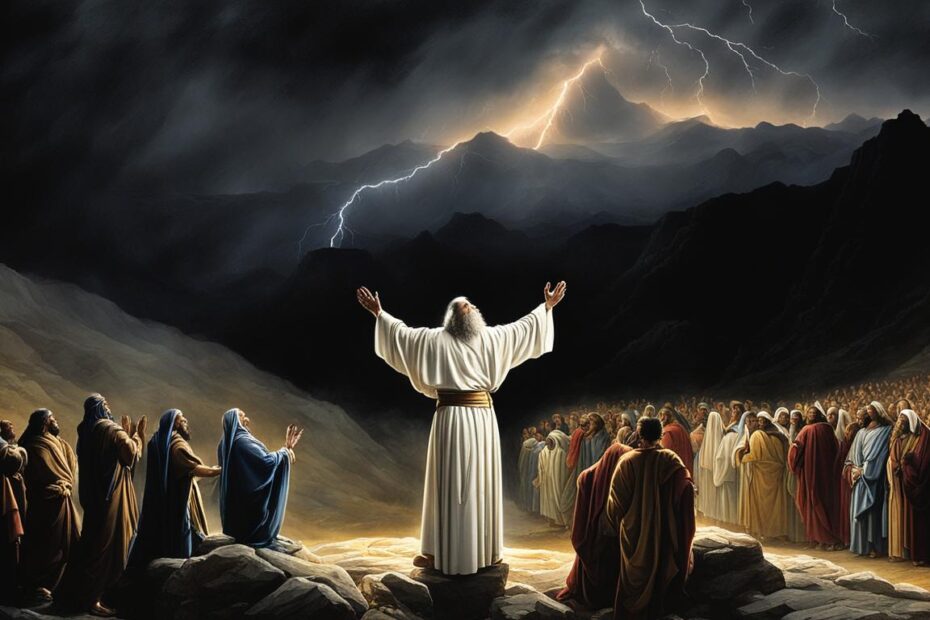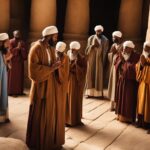In the rich tapestry of biblical narratives, one figure stands out as a remarkable intercessor – Moses. His role as a mediator between God and His people holds valuable insights that resonate with us even today. In this article, we will delve into the depths of Exodus 32-34 to uncover the power and significance of Moses as an intercessor.
Key Takeaways:
- Moses, a spiritual leader, assumed the role of intercessor for the Israelites.
- Through prayer, Moses mediated between God and His people, showcasing his power of intercession.
- Moses’s intercessory prayers reveal his deep connection and concern for his people.
- Moses’s intercession teaches us the importance of corporateness and trust in God.
- His role as an intercessor foreshadows Jesus Christ, the ultimate intercessor and Savior.
Moses’s Intercession Based on Identity and Truths
In the story of Moses as an intercessor, his role is deeply rooted in his identity with God’s people. When the Israelites were facing the consequences of their disobedience, Moses stood in the gap between them and God, bringing his unique perspective as the one who led the people out of Egypt.
Moses identified God as the deliverer, recognizing that it was God’s power and intervention that brought them out of slavery. In contrast, the people attributed their deliverance to Moses. However, Moses humbly redirected their attribution, reminding them that they were God’s people and He was the ultimate source of their freedom.
“The people associate Moses with their deliverance from Egypt, but Moses counters that the people are God’s and attributes their deliverance to Him.”
This episode teaches us an important lesson about the significance of recognizing our connectedness to others and acknowledging God as the true source of deliverance. It highlights the importance of humility and understanding that our identity is not defined solely by our own actions, but by our relationship with God and His purpose for us.
Moses’s Intercession Based on Identity and Truths – Comparison Table
| Attributes | Moses’s Intercession | People’s Attribution |
|---|---|---|
| Identity | Moses identifies with God’s people | People attribute deliverance to Moses |
| Source of Deliverance | Moses recognizes God as the deliverer | People attribute deliverance to Moses |
God’s Greater Plan and Moses’s Intercession
In the midst of God’s anger and judgment towards the wayward Israelites, Moses emerges as a powerful intercessor, pleading for mercy and demonstrating his unique role as a mediator between God and His people. This pivotal moment in Exodus 32:12-13 reveals the contrast between God’s wrath and His promises, as Moses presents the greater plan that God has for His chosen people.
As the mediator, Moses reminds God of His covenant with the Israelites and the promises made to their ancestors. He appeals to the enduring love and faithfulness of God, urging Him to turn away from the destruction He had planned. In this act of intercession, Moses aligns himself with God’s purpose and redirects His judgment towards a path of restoration and fulfillment of His divine plan.
This remarkable display of Moses’s intercession underscores the significance of intercessory prayer in our own lives. Just as Moses intervened on behalf of the people, we too have the privilege and responsibility to approach God on behalf of others, seeking His mercy and grace in times of need. Through intercession, we can play a role in redirecting divine judgment and bringing about God’s greater plan of redemption and restoration.
Moses as the Mediator
In Exodus 32:12-13, Moses’s role as the mediator between God and the people becomes evident. The contrast between God’s wrath and His promises is highlighted as Moses presents the people’s unworthiness and pleads for mercy. This role of mediation is a powerful reminder of Moses’s unique position and the importance of intercession in bridging the gap between God and His people.
By interceding on behalf of the Israelites, Moses demonstrates his deep love and concern for the people he leads. Through his words and actions, he exemplifies the qualities of a true intercessor – one who selflessly advocates for others and seeks to bring about reconciliation and restoration.
God’s Turning from Destruction
Exodus 32:12-13 also reveals the compassionate nature of God, as He responds to Moses’s intercession and turns away from His initial desire to destroy the people. This moment serves as a powerful reminder of God’s willingness to listen and respond to the cries of His people, even in the face of deserved judgment.
God’s turning from destruction in response to Moses’s intercession highlights His desire for reconciliation and restoration. It speaks to His long-suffering nature and His ultimate plan to redeem and renew His people. Through Moses’s intercession, we see a glimpse of God’s abundant mercy and His commitment to fulfilling His greater plan.
| Contrast | God’s Wrath | God’s Promises |
|---|---|---|
| Response to the people’s disobedience | Destruction and judgment | Mercy and restoration |
| Moses’s plea | Appeal for mercy | Reminding God of His promises |
| Outcome | God turns away from destruction | God fulfills His promises |
Moses’s Affirmation of God’s Plan in Intercession
In Exodus 32:14, we witness a powerful moment of intercession as Moses affirms God’s plan and receives affirmation in return. This passage illustrates Moses saying yes to God’s plan and trusting in His power. Moses understands that God’s plan is already in motion and aligns his intercession with what God has already determined to do. It is a beautiful display of faith and surrender.
Moses not only affirms God’s plan but also reminds Him of His promises and power. He acknowledges the covenant that God made with their ancestors and appeals to His commitment to restoration. This demonstrates Moses’s deep understanding of God’s character and the importance of grounding our intercession in His promises.
“Lord, if you don’t go with us personally, don’t let us move a step from this place. If you don’t go, how will it be known that your presence goes with me and with your people? Are you going with us personally, or not?” – Moses (Exodus 33:15)
Moses’s trust in God’s power and his constant reminders of God’s promises serve as an inspiration for us today. As intercessors, we are called to align our prayers with God’s plan and trust in His power to bring about His purposes. Just as Moses said yes to God’s plan, may we also have the faith and humility to surrender to His will in our prayers.

Table: Moses’s Affirmation of God’s Plan
| Key Points | Scriptural References |
|---|---|
| Moses saying yes to God’s plan | Exodus 32:14 |
| God’s affirmation of His own plan | Exodus 32:14 |
| Moses’s trust in God’s power | Exodus 32:14 |
| Moses’s reminders of God’s promises and power | Exodus 32:13-14 |
Moses’s affirmation of God’s plan in intercession teaches us the importance of aligning our prayers with God’s purposes and trusting in His power. Let us follow Moses’s example and surrender to God’s will, confident in His faithfulness to fulfill His promises.
Moses’s Intercession Acknowledging Deserved Consequences
Moses’s intercession in Exodus 32:11 is a powerful example of how he acknowledges the deserved consequences of the people’s actions while seeking favor from God. In his plea to mollify, pacify, and appease God’s wrath, Moses recognizes the gravity of the situation and the just consequences that should follow. However, he grounds his intercession in God’s promises and reminds Him of their relationship, appealing to His mercy and grace.
“O Lord, why does Your wrath burn hot against Your people whom You have brought out of the land of Egypt with great power and with a mighty hand? Remember Abraham, Isaac, and Israel, Your servants, to whom You swore by Your own self, and said to them, ‘I will multiply your descendants as the stars of heaven; and all this land that I have spoken of I give to your descendants, and they shall inherit it forever.'” (Exodus 32:11-13)
In this moment of intercession, Moses connects his plea to God’s promises, reminding Him of His commitment to bless the descendants of Abraham, Isaac, and Israel. By acknowledging the deserved consequences and simultaneously appealing to God’s covenant, Moses presents a compelling case for God’s mercy and the fulfillment of His promises.
This passage teaches us the importance of acknowledging the reality of consequences in our prayers while also recognizing the power of God’s promises. It reminds us that intercession is not about escaping the consequences of our actions, but about seeking God’s mercy and restoration in the midst of them. Just as Moses connected his intercession with God’s promises, we too can find hope and confidence in praying with an understanding of God’s faithfulness and His larger plan for our lives.
| Moses’s Intercession | Acknowledging Deserved Consequences |
|---|---|
| Moses pleads to mollify, pacify, and appease God’s wrath. | Moses recognizes the gravity of the situation and the just consequences that should follow. |
| Moses grounds his intercession in God’s promises. | Moses appeals to God’s covenant and reminds Him of His commitment to bless the descendants of Abraham, Isaac, and Israel. |
| Moses seeks favor from God. | Moses presents a compelling case for God’s mercy and the fulfillment of His promises. |
| Moses connects intercession with God’s promises. | Moses teaches the importance of acknowledging consequences and seeking restoration in the midst of them. |

In our own intercession, we can follow the example of Moses by acknowledging the reality of deserved consequences while leaning on the promises and faithfulness of God. This intercessory approach demonstrates humility, trust, and a deep understanding of God’s character. It invites us to pray with reverence and reliance on God’s mercy, seeking His restoration and favor in every circumstance.
As we connect our intercessory prayers with God’s promises, we align ourselves with His larger plan and purpose. Just as Moses’s intercession played a significant role in redirecting God’s judgment and fulfilling His promises to His people, our prayers can have a transformative impact on the lives of those we intercede for and on God’s mission in the world.
Moses’s Trust in God and His Relationship
Moses’s role as an intercessor is a prime example of his unwavering trust in God. His reliance on God’s words and belief in His revelation shaped his response to God’s instructions. In Exodus 32:7-8, Moses learned about the people’s rebellion not through sight but through God’s words, and he responded with faith.
This highlights the profound trust Moses had in God’s guidance and direction. He didn’t doubt or question the reliability of God’s words but embraced them wholeheartedly. Moses’s relationship with God was built on this trust, enabling him to intercede on behalf of the people with conviction and confidence.
“The Lord said to Moses, ‘Go down, for your people, whom you brought up out of the land of Egypt, have corrupted themselves. They have turned aside quickly out of the way that I commanded them. They have made for themselves a golden calf and have worshiped it and sacrificed to it and said, ‘These are your gods, O Israel, who brought you up out of the land of Egypt!'” – Exodus 32:7-8
Moses’s unwavering trust in God’s words is a powerful reminder for us today. In our intercession for others, we must place our confidence in the promises and revelations God has given us. Like Moses, we can rely on God’s faithfulness and respond to His words with unwavering belief, knowing that He will guide us in our prayers.
| Moses’s Trust in God | Moses’s Relationship with God |
|---|---|
| Reliance on God’s words | Interceding with conviction and confidence |
| Belief in God’s revelation | Building a foundation of trust |
| Response to God’s words with faith | Embracing unwavering trust in God |

Moses’s Trust in Action
Moses’s trust in God was not merely theoretical but manifested in his actions. He faithfully followed God’s instructions, even when the path seemed uncertain or challenging. This trust was a key aspect of Moses’s relationship with God, allowing him to fulfill his role as an intercessor effectively.
As we learn from Moses’s example, our trust in God should not be passive but active. It should drive us to faithfully obey His commands and carry out His will. Our relationship with God is deepened when we trust Him enough to step out in faith and intercede on behalf of others.
- Trust in action:
- Obediently following God’s instructions
- Fulfilling the role of an intercessor
- Active and dynamic relationship with God
In conclusion, Moses’s trust in God and reliance on His words served as the bedrock of his relationship with Him. This trust empowered him to intercede on behalf of the people with unwavering belief and obedient action. As intercessors, we can draw inspiration from Moses’s example and cultivate a deep trust in God’s guidance and promises, knowing that He will faithfully guide us and use our prayers to bring about His purposes.
God’s Mission and the Nations in Moses’s Intercession
Moses’s intercession in Exodus 32:12 acknowledges that the nations, specifically Egypt, are watching how God deals with His people. Despite their deliverance from slavery in Egypt, Moses reminds the reader that the nations are still observing. This highlights the broader mission of God in the world and the significance of how His actions towards His people impact others.
“But Moses implored the Lord his God and said, ‘O Lord, why does your wrath burn hot against your people, whom you have brought out of the land of Egypt with great power and with a mighty hand? Why should the Egyptians say, “With evil intent did he bring them out, to kill them in the mountains and to consume them from the face of the earth”? Turn from your burning anger and relent from this disaster against your people.'” (Exodus 32:11-12)
Moses’s intercession not only focuses on the immediate situation with the Israelites but also considers the impact it will have on the surrounding nations. He appeals to God’s reputation and the perception of Egypt, recognizing that their observation of God’s actions plays a crucial role in God’s mission in the world.
The Implications for Modern Intercessors
In our own intercession, we can learn from Moses’s example of considering the wider implications of our prayers. Just as Moses connected God’s actions with the nations, we can recognize that our prayers have the potential to impact not only the individuals we are interceding for but also the watching world. Our intercession can be a powerful testimony to God’s character and His work in the lives of His people.
As we seek to fulfill God’s mission in the world, let us remember that our prayers are not isolated acts but part of a greater purpose. Like Moses, may we intercede with a global perspective, mindful of the nations watching and the opportunity to demonstrate God’s love, grace, and power through our prayers.
| Implications | |
|---|---|
| Moses’s Intercession | Connects with the nations |
| Egypt’s Observation | Highlights the impact of God’s actions |
| Modern Intercessors | Have the opportunity to demonstrate God’s character |
God’s Focus on Restoration in Moses’s Intercession
Moses’s role as an intercessor in the biblical texts provides profound insights into God’s focus on restoration over retribution. In Exodus 32:9-10, Moses reminds God of His promises to the ancestors and appeals to His commitment to restoration. This highlights the importance of intercession grounded in God’s promises and His larger plan.
Throughout the Bible, God emphasizes His covenant with His people, displaying a deep desire to restore them despite their shortcomings. Moses, as an intercessor, echoes this focus by connecting restoration with God’s larger plan. His prayers acknowledge the reality of deserved consequences while affirming God’s unwavering commitment to restoration.
In our own intercessory prayers, we can draw inspiration from Moses’s example. By grounding our prayers in God’s promises and recognizing His commitment to restoration, we can align our intercession with His purposes. Rather than seeking retribution, we can seek the restoration of individuals, communities, and even nations, reflecting God’s heart and His mission in the world.
| God’s Promises and Covenant | Restoration Over Retribution | Moses’s Reminder of God’s Promises to the Ancestors | Moses Connecting Restoration with God’s Larger Plan |
|---|---|---|---|
| Throughout the Bible, God reaffirms His promises and the covenant He has made with His people. | God’s focus is on restoring His people rather than seeking retribution. | Moses reminds God of the promises He made to the ancestors of the Israelites, appealing to His commitment to fulfill them. | Moses connects restoration with God’s larger plan for His people, aligning his intercession with God’s purposes. |
| God’s promises and covenant form the foundation of intercession, providing hope and assurance of His faithfulness. | When we intercede, we should prioritize the restoration of individuals, communities, and nations, reflecting God’s heart. | Reminding God of His promises strengthens our prayers and aligns them with His steadfast love and commitment. | By connecting restoration with God’s larger plan, we participate in His work of redemption and renewal. |
Summary:
Moses’s intercession in Exodus 32:9-10 emphasizes God’s focus on restoration rather than retribution. By grounding our prayers in God’s promises and His larger plan, we can align our intercession with His purposes, seeking the restoration of individuals, communities, and nations. This showcases God’s unwavering commitment to restoring His people and invites us to participate in His work of redemption and renewal through intercessory prayer.
Throughout the Bible, God’s promise of restoration and His commitment to His people’s well-being are evident. Moses’s role as an intercessor teaches us the power of connecting our prayers with God’s promises and His larger plan. As we intercede for others, let us remember that God’s focus is restoration, and may our prayers align with His heart and mission in the world.
Conclusion: Moses as a Powerful Intercessor Pointing to Jesus
In exploring the role of Moses as an intercessor in biblical texts, we have discovered valuable insights into the power and significance of intercession. Moses serves as an example for us, showcasing the importance of corporateness, trust in God, recognition of deserved consequences, and alignment with God’s promises and larger plan.
However, Moses’s role as an intercessor ultimately points us to someone even greater – Jesus Christ. Just as Moses mediated between God and His people, Jesus’s intercession carries the power of atonement and salvation. His intercession is not limited to a specific group but encompasses God’s mission in the world.
As intercessors, we are invited to follow Jesus’s example and participate in God’s mission through prayer. We can tap into the same power and authority that Moses and Jesus demonstrated, trusting in the transformative impact of intercession. Through our prayers, we align ourselves with God’s will and contribute to His work of restoration and redemption in the world.
So, let us embrace the example of Moses as an intercessor and look to Jesus, the ultimate intercessor, for inspiration. May we fervently intercede for others, seeking God’s mercy, guidance, and transformation in their lives. As we do so, we can become instruments of God’s love and grace, participating in His mission to bring healing, reconciliation, and salvation to all.
FAQ
What is Moses’s role as an intercessor in the Bible?
Moses is portrayed as a powerful intercessor in the Bible, mediating between God and His people.
What insights can we gain from the study of Exodus 32-34 about Moses’s role as an intercessor?
Through inductive Bible study of Exodus 32-34, we can gain valuable insights into Moses’s role as an intercessor and the lessons it holds for us today.
How does Moses’s intercession in Exodus 32:7 highlight the importance of connectedness and acknowledging God as the ultimate source of deliverance?
In Exodus 32:7, Moses’s intercession is rooted in his identity with God’s people. He attributes the people’s deliverance to God and recognizes their connectedness to Him.
What contrast does Exodus 32:12-13 reveal about God’s wrath and promises, and how does Moses’s intercession play a role in redirecting God’s judgment?
Exodus 32:12-13 presents a contrast between God’s wrath and promises. Moses, as the mediator, presents this contrast to God and redirects His initial desire to destroy the people.
How does Exodus 32:14 emphasize the importance of trusting in God’s plan and power in our intercession?
Exodus 32:14 shows Moses affirming God’s plan and God responding in affirmation. Moses aligns his intercession with what God has already determined to do, highlighting the importance of trusting in God’s plan and power.
How does Moses’s intercession in Exodus 32:11 acknowledge the reality of consequences and the power of God’s promises in our prayers?
Moses’s intercession in Exodus 32:11 is described as a plea to mollify, pacify, and appease God’s wrath. He grounds his intercession in God’s promises and reminds Him of their relationship.
What does Exodus 32:7-8 teach us about Moses’s trust in God and reliance on His words?
In Exodus 32:7-8, Moses learns of the people’s rebellion through God’s words, not by sight, and responds with belief. This showcases the importance of trust and belief in our relationship with God as we intercede for others.
How does Moses’s intercession in Exodus 32:12 highlight the broader mission of God in the world and the impact of His actions towards His people on others?
Moses’s intercession in Exodus 32:12 acknowledges that the nations, specifically Egypt, are watching how God deals with His people. This highlights the broader mission of God in the world and the significance of His actions towards His people on others.
What is the significance of Moses’s intercession in Exodus 32:9-10 being grounded in God’s focus on restoration rather than retribution?
Despite the people being described as stiff-necked, Moses reminds God of His promises to their ancestors and appeals to His commitment to restoration. This highlights the importance of intercession grounded in God’s promises and His plan for restoration.
Source Links
- http://storage.cloversites.com/dllowrieministriesinc/documents/Exodus 32 9-34.pdf
- https://adventureswithgod.blog/2019/04/15/10-things-moses-has-taught-me-about-intercession/
- https://www.blueletterbible.org/Comm/stewart_don/faq/does-god-know-everything/24-did-moses-persuade-god-to-change-his-mind.cfm








